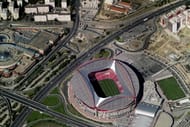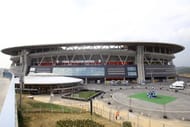Lisbon
Crouched in an almost foetal position in my uncomfortable seat on the Ryan Air flight to Lisbon, I am nodding off. Seated behind, my friend grabs me by the shoulder and asks me to look outside the window. From my aisle seat, I lean over and take in the golden sands running into the never-ending Atlantic. From my vantage point, it would seem as if waves were a myth. As the aircraft descends, I am momentarily transfixed by the foamy patches on the vast ocean. And then I see it. The unmistakable red iron beams of the Benfica’s Estadio da Luz.
A few moments later, I see a second sight. The dark green roof that can only be Sporting Lisbon’s Estadio Jose Alvalade. My mind goes back more than nine years ago, when I first saw the red and green structures during Euro 2004, the tournament for which the stadiums were revamped. These sites are intimately associated with maestros like Eusebio, Figo, Rui Costa. Saudade is a Portuguese word that has no direct English translation. It can be described as a feeling of emptiness or longing for something which has been lost irretrievably. It is said that if one stays in Portugal long enough, one can experience saudade. I have my saudade moment before we even land in Lisbon.
The reception desk at the hostel is manned by a vivacious guy called João. João like João Moutinho, I ask? Exactly! But I must let you know that he is a traitor in my eyes. Sporting Lisbon, we took care of him for so many years. He became a great player at Sporting. And then he just left for Porto. You don’t go to a rival team just like that, just because you are offered more money. He is visibly hurt, and I hastily distract him by congratulating him for Portugal’s recent qualification for the World Cup. Obrigado, he says, grinning again.
Istanbul
I thought Europe was football crazy. And then I came to Turkey. On the ferry from Kadikoy to Besiktas, I watch the top ten goals from the weekend’s Turkish League action on a flat-screen. A man in a tattered brown blazer and shabby stubble is similarly occupied. When it ends, there is a hint of a smile on his face. Our eyes meet, and he points at the television screen and flashes me a thumbs-up sign.
The BJK Inonu stadium is only a short walk from the Besiktas ferry terminal. The only stadium in the world from where one can see two continents. The stadium is being redeveloped, but I can see the historic tower with the club crest on it even above the barricades that are plastered with the Vodafone logo. From almost under the tower, I look across the Bosphorus to the other continent.
Nothing is lost in translation when I ask “Galatasaray, Fenerbahce, Besiktas”? Irrespective of loyalties, I always offer a thumbs-up to my comrade, to indicate that I share his passion. A whole new world opens up that way. A couple of university students walk with us for almost a kilometer to help find a place we are looking for. In the Grand Bazaar, a wizened old vendor sipping apple tea teaches me to pronounce Galatasaray correctly. The Western world tends to pronounce the word at once, but it is in fact two words put together. Galata is a historic region on the European side of Istanbul, home to the Galatasaray Lissei, the prestigious high school where the club was founded. Saray is Turkish for palace. There is a fourth club in Turkey, make no mistake. Trabzonspor has a rather big following in Istanbul too. The supporters are mostly migrants from the north-east, where Trabzon is based.
In a bread store, the genial owner tells me about the UltrAslan, Galatasaray’s radical supporter group that saved the club from bankruptcy with money made from the sale its own merchandise. He tells me about bands of UltrAslan marching down from Tunel to Taksim Square on Istiklal Street with their hands in their jackets. Some of them are hiding knives. He doesn’t approve of the violent overtones associated with football in this country. His assistant, a young man in his twenties, shakes his head. It is simple, he tells me. When clubs from Europe come to play here, we want them to know they are in hell, that football for us means more than it ever has for them.

